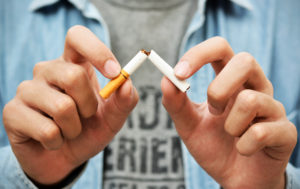
Becky Yoza, DNP
FAMILY MEDICINE
Becky has 14 years combined experience in medical/surgical and emergency nursing. She also teaches undergraduate and graduate nursing at Hawaii Pacific University. Originally a sociologist, Becky trained as a nurse to gain knowledge for her research, but she ended up loving nursing so much she never went back! Born and raised in Michigan, Becky has lived in Hawaii since 2010 and never wants to leave.
Quit Smoking
There are many benefits after one quits smoking. Indeed, smoking cessation is tough. But, it has many health benefits. In brief, it lowers your chances of coronary heart disease, lung diseases, kidney failures, infections, and even cancer. In addition, the skin becomes softer. Also, facial wrinkles cease to exist. It improves your sex life and builds more stamina to do physical activities, too. Tips on how to stop smoking are detailed below.

Benefits of Smoking Cessation
Smoking cessation has many benefits. To start, it reduces the chances of getting osteoporosis- a debilitating condition that weakens the bones. Also, quitting smoking will also improve your overall health. The effects will be visible from the first day.
How to quit:
Smoking cessation is hard. But, many people can stop the habit. We encourage following an easy to remember acronym when quitting smoking. Follow the acronym ‘START’ to take the steps towards quitting the habit.
S = Set a quit date. Importantly, this step is crucial to smoking cessation success.
T = Tell people around you, friends & family, that you have quit smoking.
A = Anticipate and plan for the problems you may face while quitting.
R = Remove all packets of cigarettes and other tobacco products from your reach. To note, this step is beneficial as it limits the opportunity to smoke again.
T = Talk to a professional, or one who has successfully quit, about getting help.
Composition of Smoke:
Cigarette smoke contains over 4,000 chemicals. To note, we know over 50 causes of cancer by carcinogens and other poisons.
Nicotine
To start, nicotine is the main chemical. In fact, that substance makes you addicted to cigarettes and tobacco. It enters the bloodstream and stimulates the brain. Since nicotine is addictive, you will continue to smoke. The urges arise when the blood level of nicotine falls. This leads to withdrawal symptoms in the person who is quitting. The withdrawal symptoms can be any or all of the following.
- Firstly, one may experience anxiety.
- Secondly, one may be restlessness.
- Also, headaches and increased irritability are common.
- Increased hunger symptoms can also develop.
- Additionally, one can have difficulty in concentrating.
- Lastly, a person who wants to quit smoking may experience dizziness and/or constipation.
These symptoms get relieved once a cigarette is lit. Thus, this defines nicotine addiction. Withdrawal symptoms appear within the first hour of quitting and peak after about 24 hours. After this, the symptoms ease out and totally cease in about 2-4 weeks.
The major reason few smokers quit is because of the strong chemical, nicotine. The body has a hard time as it is addicted. Also, easy access to tobacco products makes it hard, too. For chronic smokers, the use of nicotine replacement therapy (NRT), e-cigarettes or a smoking cessation medicine, results in higher success compared to cutting off.
Tar in smoke
Tar is the blackish deposit on the lungs. Typically, it gets into the blood vessels and is carried to other parts of the body.
Carbon monoxide
This gas reduces the oxygen-carrying capacity of the blood. It is harmful in pregnant women who smoke or whom are exposed by second-hand smoke.
Smoking in pregnancy
Smoking in pregnancy increases the risk of:
- Miscarriage and stillbirth within the first week of life–the risk is increased by about one-third if the mother was a smoker
- Complications of pregnancy, including bleeding during pregnancy, detachment of the placenta, premature birth, and ectopic pregnancy.
- Congenital defects in the baby–such as cleft palate, asthma.
- Low birth weight. Babies born to women who smoke are on average 8 oz lighter than babies born to comparable non-smoking mothers. Premature and low-birth-weight babies are more prone to illness and infections.
Passive smoking
Children, non-smoking adults, and unborn babies can be affected by other’s cigarette smoke. Children who live in a household with a smoker are more likely to inhale smoke and develop various health problems than children who don’t.
Dirty side effects of Smoking:
- Smoking is an expensive habit.
- The smell of tobacco spoils the smoker’s breath, clothes, hair, skin and the entire house smells of stale tobacco. Non-smokers find this smell is unpleasant.
- The smoker’s sense of taste and sense of smell are dulled. There’s reduced enjoyment of food and drinks.
Benefits in the long run:
The benefits outweigh the troubles which are taken towards kicking the habit of smoking from your life. The major benefits include:
- You will look younger and your life expectancy goes up.
- Your health improves, with a sense of renewed vitality.
- Lots of money and time is saved by not spending it on cigarettes
Tips on How to Stop Smoking:
Tips on how to stop smoking includes believing in yourself. Smoking is an acquired habit and can be reversed easily. As smoking is very addictive, it usually overpowers a person’s willpower, but there are lots of medications to help you stop, viz. Nicotine replacement therapy (NRT), E-cigarettes, Varenicline (Champix®) and Bupropion (Zyban®).
Benefits of Stopping Smoking
Once a person quits smoking or use of tobacco, it uplifts his or her health and lifestyle. There is a reduction in chances of getting serious lifestyle diseases like heart disease, cancer, chronic obstructive pulmonary disease (COPD) and peripheral arterial disease. Further, stopping smoking leads to other benefits like,
- Improvement in fertility problems like erectile dysfunction.
- Improvement in eyesight
- The skin becomes more radiant
- The gums and teeth get healthier
- There’s no bad breath or yellow teeth
- The risk of pregnancy complications reduces manifold.
- The taste of food and drinks improves
- You feel better about yourself
The sooner you stop smoking, the greater the reduction in the risk of getting serious diseases. If you stop before the age of 50, your risk of premature death is the same as that of a non-smoker.
Time after Quitting your last Cigarette and Visible Health Benefit
72 hours
Breathing becomes smoother and easier. Bronchial tubes relax and energy levels increase. Oxygen levels in the body improve.
1 month
Skin appearance improves. Increased stamina.
3-6 months
Cough, wheezing, and breathing problems cease. Lung function increases by up to 10%.
1 year
The risk of a heart attack falls by 50% compared to that of a smoker.
10 years
The risk of lung cancer falls by 50% compared to that of a smoker.
15 years
Risk of heart attack falls to the same level as that of a non-smoker.
TelaPets offers medical teleadvice/teletriage with a Hawaii veterinarian, at a time that’s convenient for you. Set up a telemedicine appointment for your pet using TelaPets and get quick help now!
Meet some of our doctors and experts
Here are some of the conditions we treat:
Questions regarding treatment? Contact us! We're here to help.
ALL MAJOR INSURANCE ACCEPTED
Visit with a board-certified Hawaii doctor online or by phone.

Here’s what people are saying
Kaimani
North Shore, Oahu
![]()
"I thought the whole process was pretty cool. To be able do this all on the phone instead of wasting an hour or two to see my doctor and wait all that time to speak with my doctor for only 5 minutes. The best part was I didn't feel rushed either during the video consult. The doctor really took her time speaking with me and more so than my regular doctor would have the time to do so with me.
Susan
Manoa, Oahu
![]()
This was so convenient for me and my family, especially since we are traveling and this saved me a trip to Urgent Care, who knows how long that could have taken. I appreciate how prompt the doctor and the staff were with contacting me.
Meliana
Lahaina, Maui
![]()
This was so great for my Dad to use as he is visiting from another country and he doesnt have health insurance. For something as simple as an earache, we didn't have to spend so much money on a quick doctor's visit. Plus the doctor was able to help my Dad sooner than our scheduled appointment!
Nalu
Mililani, Oahu
![]()
"Everything was very helpful from the initial call down the getting my prescription. I wish I could take this service back home with me to Canada!"
Allie
Lahaina, Maui
![]()
The whole experience was super fast! That was thee fastest appointment I have ever had, especially for something as simple as a prescription refill. Plus I had to pick my son up for school.
Nicki
Kapolei, Oahu
![]()
The fact that I was able to do all of this without getting out of my bed. From the time I made my appointment to hearing my prescription is ready, its been less than 1 hour.
Kawika
Aiea, Oahu
![]()
Video consult was my favorite part. I've never done a telemedicine visit before and it was cool. I can really see this being great for people with busy schedules, not to mention there is nothing like this in Hawaii yet.
Salesi
Lihue, Kauai
![]()
"Convenience from the comfort of your own home. Some times it can be a hassle getting out of house when you're already not feeling well to see your doctor, or even just to get a refill. But this is a very convenient service."
Andrea
Kailua, Oahu
![]()
"Just being able to do it at home and ON TIME was great, because I didn't have to spend the time to commute and spend time in the waiting room to MAYBE see my doctor at my scheduled appointment time. The doctor called me as soon on the dot of my appointment time."
Puka
Waimea, Big Island
![]()
The best part was definitely seeing the doctor on the video call. It is comforting as a patient that there is a real doctor on the other end laying eyes on me and the symptoms I could be having.
Chris
Kona, Big Island
![]()
"The doctor was great and took his time explaining my symptoms and treatment! Actually the whole experience was fantastic! I can't believe how efficient you guys are. It hasn't even been 30 minutes and I've already been contacted by pharmacy that my prescription is ready. This was great. I would definitely use this service again and highly recommend to others!"
We're trusted by local individuals and organizations.









